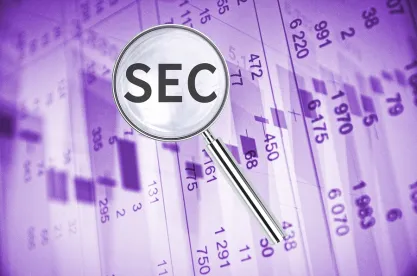Since Gary Gensler became chair of the U.S. Securities and Exchange Commission in April 2021, his agency has signaled an active agenda that many expect will be aggressively enforced. Cornerstone Research recently brought together distinguished experts with SEC experience to share what they expect the SEC will focus on in 2022. The expert forum, “The Gensler SEC: Policy, Progress, and Problems,” featured Joseph Grundfest, a former commissioner of the SEC and currently serving as the W. A. Franke Professor of Law and Business at Stanford Law School; and Mary Jo White, senior chair, litigation partner, and leader of Debevoise & Plimpton’s Strategic Crisis Response and Solutions Group who previously served as chair of the SEC and as U.S. Attorney for the Southern District of New York. Moderated by Jennifer Marietta-Westberg of Cornerstone Research, the forum was held before an audience of attorneys and economists and explored the major regulatory and enforcement themes expected to take center stage in the coming year.
ESG Disclosures and Materiality
In its Unified Regulatory Agenda first released in June of last year, the SEC indicated that it will propose disclosure requirements in the environmental, social, and governance (ESG) space, particularly on climate-related risks and human capital management. However, as documented by the numerous comments received as a result of the SEC’s March 15, 2021, request for input on climate change disclosures, there is substantial debate as to whether these disclosures must, or should, require disclosure only of material information. During the expert forum, Grundfest and White agreed that ESG disclosures should call for material information only. However, they have different predictions on whether ESG disclosures actually will be qualified by a materiality requirement.
White emphasized that materiality is a legal touchstone in securities laws. “If the SEC strays far from materiality, the risk is that a rule gets overturned,” she said. “Not every single rule needs to satisfy the materiality requirement, but it would be a mistake for the SEC not to explain what its basis for materiality is in this space.”
Grundfest added, “There is a spectrum of ESG issues, and while some are within the SEC’s traditional purview, others are new and further away from it. For example, to better ensure robust greenhouse emissions disclosure, the Environmental Protection Agency should be the one to require disclosure rules that would not be overturned.”
Gensler has indicated that investors want ESG disclosures in order to make investment and voting decisions. For instance, in his remarks before the Principles for Responsible Investment in July 2021, Gensler stated that “[i]nvestors are looking for consistent, comparable, and decision-useful disclosures so they can put their money in companies that fit their needs.” White predicts that some but not all ESG disclosure requirements in the proposed rules the SEC is working on will call for material information.
Grundfest, however, believes that the rules the SEC eventually adopts will require disclosure only of material information. “The SEC’s proposal on ESG disclosures will ask for everything, from the moon to the stars,” he said. “But public comments will sober the rules. The SEC staff will take into account the Supreme Court standard and the Chevron risk. It will settle on adopting materiality-based disclosure rules.”
There is also debate over the potential definition of materiality in the context of any proposed ESG disclosures. The panelists were asked whether the fact that large institutional investors assert various forms of ESG information are important to their investment decisions is a sufficient basis upon which to conclude that the information is material. Neither White nor Grundfest believes the Supreme Court as currently composed would accept this argument, but they differ on the reasons.
Grundfest believes the Supreme Court will stick with its approach of a hypothetical reasonable investor. “The fact that these institutional investors ask for this information doesn’t necessarily mean that it’s material,” he said. “If the SEC wants to have something done in this space, it has to work within the law.”
White said an important aspect of the rule will be the economic analysis, though she, too, does not think materiality can be “decided by an opinion poll among institutional investors.” For example, a shareholder proposal requesting certain information that has not received support does not necessarily make the information immaterial. “The Supreme Court will be tough on the survey approach,” she said.
Digital Assets and Crypto Exchanges
In several statements and testimonies, Gensler has declared the need for robust enforcement and better investor protection in the markets for digital currencies. He has publicly called the cryptocurrency space “a Wild West.” In addition to bringing enforcement actions against token issuers and other market participants on the theory that the tokens constitute securities, the SEC under his leadership has brought enforcement actions against at least one unregistered digital asset exchange on the theory that the exchange traded securities and should therefore register as securities exchange.
“The crypto space is the SEC’s most problematic area,” Grundfest said. “Franz Kafka’s most famous novel is The Trial. It’s about a person arrested and prosecuted for a crime that is never explained based on evidence that he never sees. Some recent SEC enforcement proceedings make me wonder whether Kafka is actually still alive and well, and working deep in the bowels of the SEC’s Enforcement Division.” In support of this literary reference, Professor Grundfest noted that, in bringing enforcement actions against crypto exchanges alleging that they traded tokens that were unregistered securities, the SEC never specified which tokens traded on these exchanges were securities. “This is almost beyond regulation by enforcement. It’s regulation by FUD—fear, uncertainty, and doubt,” Grundfest said.
White predicted that, of the 311 active crypto exchanges listed by CoinMarketCap as of December 1, 2021, the SEC will bring cases against at least four in the coming year.
Gensler has publicly argued for bringing the cryptocurrency-related industry under his agency’s oversight. “We need additional congressional authorities to prevent transactions, products, and platforms from falling between regulatory cracks,” he said in August at the Aspen Security Forum. But neither White nor Grundfest believes the current Congress will enact legislation giving the SEC authority to regulate crypto transactions that do not meet the definition of an investment contract under the Howey test.
In November 2021, a federal jury in Audet v. Fraser at the District Court of Connecticut decided that certain cryptocurrency products that investors purchased were not securities under Howey. Neither Grundfest nor White believes this finding will cause the SEC to become more cautious about asserting that some forms of crypto are securities.
“One jury verdict is hardly a precedent,” White said. “The facts of the case didn’t have many of the nuances under Howey that other cases have. It will not deter the SEC.”
The panelists agreed that SEC enforcement activity will be aggressive in the crypto space. A report by Cornerstone Research, titled SEC Cryptocurrency Enforcement: 2021 Update, found that, under the new administration, the SEC has continued its role as one of the main regulators in the cryptocurrency space. In 2021, the SEC brought 20 enforcement actions against digital asset market participants, including first-of-their-kind actions against a crypto lending platform, an unregistered digital asset exchange, and a decentralized finance (DeFi) lender.
Proxy Voting
With the 2022 proxy season on the horizon, people will be watching the SEC closely, as Gensler’s Commission recently adopted new rules for universal proxy cards, and it has revisited amendments adopted under the former chair of the SEC, Jay Clayton.
Last November, the SEC adopted universal proxy rules that now allow shareholders to vote for their preferred mix of board candidates in contested elections, similar to voting in person. These rules would put investors voting in person and by proxy on equal footing. “Universal proxy was proposed at the time when I was the chair of the SEC, and the logic for the rule is overpowering,” White said. “In adoption, some commissioners had reservations on the thresholds of voting power a dissident would be required to solicit, but voted in favor anyway based on its logic. It was a 4 to 1 vote.”
Grundfest and White expect the number of proxy contests that proceed to a vote will go up as a result. From 2019 to 2020, the incidence of proxy contests increased from 6 to 13. Looking ahead to the coming year, Grundfest predicts the rule change will increase the incidence of proxy contests by somewhere between 50% and 100%. White predicts a more modest increase of about 50%.
Regarding rules on proxy voting advice, the SEC issued Staff Legal Bulletin No. 14L (CF) last November to address Rule 14a-8(i)(7), which permits exclusion of a shareholder proposal that “deals with a matter relating to the company’s ordinary business operations.”
The bulletin puts forth a new Staff position that now denies no-action relief to registrants seeking to exclude shareholder proposals that transcend the company’s day-to-day business matters. “This exception is essential for preserving shareholders’ right to bring important issues before other shareholders by means of the company’s proxy statement, while also recognizing the board’s authority over most day-to-day business matters,” the bulletin said.
Both White and Grundfest believe a modest number of issuers will go to court in the 2022 proxy season seeking to exclude Rule 14a-8 shareholder proposals as “transcending” day-to-day operations. “I think companies will challenge shareholder proposals in court but not a lot,” White said. “It depends on the shareholder proposal.”
Grundfest believes any such cases would be driven as much by CEOs as by any other factor. “Companies may challenge a shareholder proposal in court if they have a CEO who is offended by a certain proposal or for First Amendment reasons,” he said. Grundfest cited a hypothetical example of a software company in Texas with a shareholder proposal on gun rights or abortion rights, which have nothing to do with the cybersecurity software the company produces. “It would be hard to force a company to put forth a politically charged proposal that is not related to that company’s business,” he said. “If it’s a First Amendment right, the company will go to court.”




 />i
/>i
